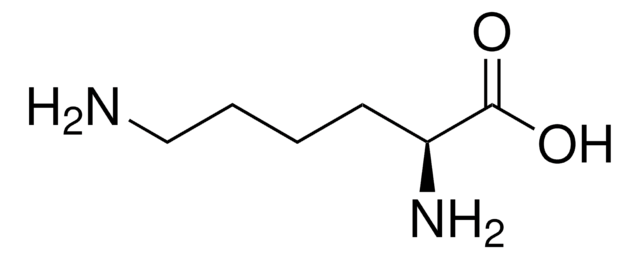L1884
L-Lysine acetate salt
≥98% (HPLC), suitable for ligand binding assays
Synonyme(s) :
(S)-2,6-Diaminohexanoic acid
About This Item
Produits recommandés
Nom du produit
L-Lysine acetate salt, ≥98% (HPLC)
Niveau de qualité
Essai
≥98% (HPLC)
Forme
powder
Technique(s)
ligand binding assay: suitable
Couleur
white
Chaîne SMILES
CC(O)=O.NCCCC[C@H](N)C(O)=O
InChI
1S/C6H14N2O2.C2H4O2/c7-4-2-1-3-5(8)6(9)10;1-2(3)4/h5H,1-4,7-8H2,(H,9,10);1H3,(H,3,4)/t5-;/m0./s1
Clé InChI
RRNJROHIFSLGRA-JEDNCBNOSA-N
Vous recherchez des produits similaires ? Visite Guide de comparaison des produits
Actions biochimiques/physiologiques
Code de la classe de stockage
11 - Combustible Solids
Classe de danger pour l'eau (WGK)
WGK 2
Point d'éclair (°F)
Not applicable
Point d'éclair (°C)
Not applicable
Équipement de protection individuelle
Eyeshields, Gloves, type N95 (US)
Faites votre choix parmi les versions les plus récentes :
Certificats d'analyse (COA)
It looks like we've run into a problem, but you can still download Certificates of Analysis from our Documents section.
Si vous avez besoin d'assistance, veuillez contacter Service Clients
Déjà en possession de ce produit ?
Retrouvez la documentation relative aux produits que vous avez récemment achetés dans la Bibliothèque de documents.
Les clients ont également consulté
Notre équipe de scientifiques dispose d'une expérience dans tous les secteurs de la recherche, notamment en sciences de la vie, science des matériaux, synthèse chimique, chromatographie, analyse et dans de nombreux autres domaines..
Contacter notre Service technique





